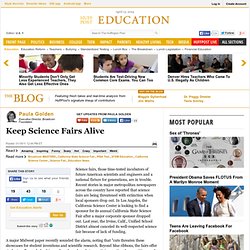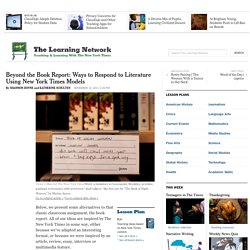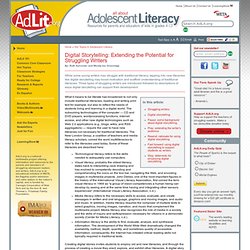

Initiatives: Poetry Out Loud: National Recitation Contest.
Paula Golden: Keep Science Fairs Alive. Science fairs, those time-tested incubators of future American scientists and engineers and a national fixture for generations, are in trouble.

Recent stories in major metropolitan newspapers across the country have reported that science fairs are being threatened with extinction when local sponsors drop out. In Los Angeles, the California Science Center is looking to find a sponsor for its annual California State Science Fair after a major corporate sponsor dropped out. Last year, the Irvine, Calif., Unified School District almost canceled its well-respected science fair because of lack of funding.
A major Midwest paper recently sounded the alarm, noting that "cuts threaten these showcases for student inventions and scientific research. Beyond blue ribbons, the fairs offer students college scholarships and are launch pads to prestigious national competitions and even careers. " Amen. Beyond the Book Report: Ways to Respond to Literature Using New York Times Models. Victor J.

Blue for The New York TimesWord, a bookstore in Greenpoint, Brooklyn, provides guidance to browsers with irreverent “shelf talkers,” like this one for “The Book of Night Women,” by Marlon James.Go to related article » | Go to related slide show » Below, we present some alternatives to that classic classroom assignment, the book report. All of our ideas are inspired by The New York Times in some way, either because we’ve adapted an interesting format, or because we were inspired by an article, review, essay, interview or multimedia feature. Do you assign book reports, in any format, to your students? What do they look like? A Times-Style Book Review Read The Times’s Books section to scan several current book reviews of novels, story collections and poetry, and to use the search feature to find reviews of older books.
Next, write your own Times-style review of a book, incorporating many of these elements. Book Talk, With You as Host Judging the Book by Its Cover. Publishing Tools. DoItYourself Marketing Services. Parker/Ross rocking summarizers by Ms. Ross. What makes a good project. Word meaning game. « Tune Into English.
Digital Storytelling: Extending the Potential for Struggling Writers. By: Ruth Sylvester and Wendy-lou Greenidge While some young writers may struggle with traditional literacy, tapping into new literacies like digital storytelling may boost motivation and scaffold understanding of traditional literacies.

Three types of struggling writers are introduced followed by descriptions of ways digital storytelling can support their development. What it means to be literate has broadened to not only include traditional literacies, reading and writing print text for example, but also to reflect the needs of students living and learning in a digital world. The subsuming technologies of the computer — CD and DVD players, wordprocessing functions, Internet access, and other new digital technologies such as Web 2.0 applications (e.g., blogs, wikis, and RSS aggregators) — require the user to have new literacies not necessary for traditional literacies.
Technological literacy refers to the skills needed to adequately use computers. Struggling writers Back to Top Kyle Ray. Nine things every teacher should know about words and vocabulary instruction Nine things every teacher should know about words and vocabulary instruction [pdf] Building Vocabulary. Gotbrainy. Vocabulary Games and Resources. Interactive Whiteboard Resources. Switch Zoo Make New Animals. 5 Fake Facebook templates and pages for student projects. April 16, 2011 by mrkaiser208 Facebook is the place that kids hang out after school.

Heck, it’s the place many of them hang out during school. It is definitely a platform they are comfortable with communicating on. Why not use student enthusiasm for Facebook to generate learning opportunities in the classroom? I have seen several classes in the past few weeks work on Facebook projects. Science might be a little harder, but imagine students pretend that they are a part of a chemical reaction. There are several different platforms for doing Facebook projects in the classroom. Fakebook: This online app is the best I have seen. My Fake Wall (no longer functional) This is a cool template, much like Fakebook. PowerPoint template: This page template opens in PowerPoint, but functions surprisingly as a Facebook page. MS Word template: This template is a little harder to use and doesn’t look quite as good as the others, but it is another option.